5th Floor, West Tower, World Financial Centre
1 Dong San Huan Middle Road
Chaoyang District, Beijing 100020, China
Tel: +86 10 5081 5880

December 01, 2020
SAIF Held Professional Master's Degree Thesis Supervisors’ Seminar
In order to further ensure the quality of the professional master's degree theses at Shanghai Advanced Institute of Finance (SAIF), promote the interaction and communication between thesis supervisors, and enhance the understanding on the standards and requirements of thesis writing by SAIF programs, on November 9th, the Thesis Supervision Committee (TSC) of SAIF, Shanghai Jiao Tong University (SJTU) held a luncheon titled “Professional Master's Degree Thesis Supervisors’ Seminar”. Nearly 40 supervisors of master's degree theses at SAIF in 2020/2021 exchanged and discussed through on-site and online participation. Prof. Qigui Zhu, Secretary of the CPC Committee of SAIF and Chairman of TSC, presided over the seminar and delivered a speech. First of all, he thanked all internal and external supervisors for their hard work and support to SAIF and stated that the achievements made by SAIF over the past 11 years cannot be separated from the efforts of every faculty member. He pointed out that the "Opinions on Fully Implementing the Responsibilities of Postgraduate Supervisors to Cultivate Morality and People" issued by the Ministry of Education put forward higher requirements for supervisors. As an integral part in the training of professional degree masters, thesis writing must thoroughly adhere to the Party's educational policy. At the event, Prof. Jie Zhang, Faculty Director of SAIF MBA Program, Prof. Tan Wang, Faculty Director of SAIF MF Program, and Prof. Fei Wu, Faculty Co- Director of EED Programs respectively elaborated all aspects of thesis writing in MBA, MF and EMBA programs, and also summarized the overall results of MBA, MF and EMBA theses in 2020. Later, the participating supervisors stated their views on a number of issues, including how to effectively mobilize the enthusiasm of students, how to improve the writing standard of theses, what kind of guidance should be given to MBA, MF and EMBA students respectively, whether there should be certain rules for case-based theses and how to effectively ensure the standardization of theses. They put forward many valuable suggestions and advices and also shared their lessons in thesis supervision.
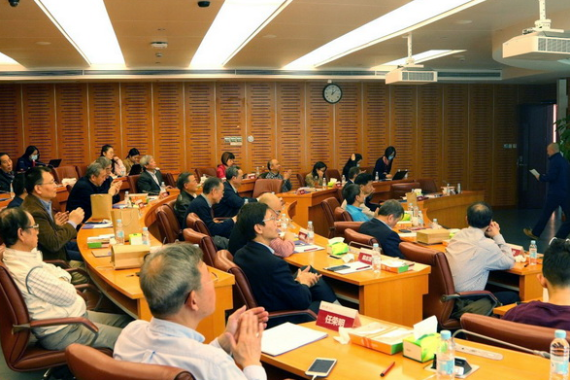
December 01, 2020
Rise Against the Trend: The mean and median starting salaries of SAIF MF graduat ...
Recently, Shanghai Advanced Institute of Finance (SAIF), Shanghai Jiao Tong University (SJTU) released the employment report of SAIF Master of Finance (MF) graduates in 2020. The report shows that despite the global economic and social turmoil and the overall grim employment situation affected by COVID-19, the employment figures of SAIF MF graduates still rose against the dim trend and continued to maintain a 100% employment rate. The mean and median starting salaries of SAIF MF graduates both reached record highs, demonstrating the strong market competitiveness of the graduates. It is reported that among this year's 84 SAIF MF graduates, apart from 3 graduates who decided to continue their studies, nearly 90% of the 81 graduates received offers before the Chinese New Year and assured their favorite jobs six months before graduation. The average salary is RMB355,000 and the median figure is RMB300,000, up 11.3% and 11.1% respectively from 2019, with 14.8% of the graduates earning more than RMB600,000/year. As SAIF’s flagship program, SAIF MF has always been in the lead in employment data among comparable institutions and universities. This year, the overall employment statistics still fully highlights SAIF MF’s differentiators of Internationalization, Specialization and High Level. Statistics shows that 4% of the 81 graduates moved to Europe and the United States, while another 10% went to work in Hong Kong and other destinations. In terms of industries, asset management and investment banking/securities/financial advisory are two main sectors for this year's graduates. The former has attracted 34.6% of the graduates, and employers include leading domestic and foreign investment institutions such as Temasek, Huaping Investment and Tencent Investment. The latter accounted for 33.4%, including international investment banks such as Bank of America Securities, JP Morgan Chase, Morgan Stanley and Citigroup, as well as domestic head institutions such as China International Capital Corporation Limited (CICC) and CITIC Securities. Online leaders have also become new hotspot targets for SAIF MF graduates, including ByteDance, Meituan Dianping, Bilibili and other unicorn companies. In terms of functions, investment research posts have become the most popular positions for this year's SAIF MF graduates, accounting for 42%, followed by consulting/strategic investment, investment banking and other traditional preferred functions, accounting for 13.6% and 11.1% respectively. In addition, thanks to the tailored career guidance of SAIF Career Development Center, some graduates with strong interest and strength in quantitative research have won quantitative-related offers from top institutions at home and abroad, including Morgan Stanley, Citigroup and CITIC Securities. The career development of SAIF graduates cannot be separated from the long-term support and wide recognition of employers, who have given positive feedback on the performance of SAIF MF graduates. According to CICC, which has successively recruited SAIF MF graduates for years, "SAIF fosters and delivers many outstanding talents for CICC and the financial sector at large every year, who strive to realize their dreams of youth and struggle in investment banking, stock, fixed income, private investment, research, strategic development and other roles. We hope that SAIF would cultivate more young professionals of the new era with ideals and energy, who will continue to explore the financial world, move forward, work hand in hand to forge CICC’s ambition and strive to build the great Chinese dream." Also one of the frequent employers of SAIF graduates, Guangfa Fund commented, "Essentially, we hire SAIF MF graduates every year, most of who are sound in expertise, steadfast and diligent. They are often high performers in the investment research positions of the company. We needs graduates who can not only look up at the starry sky and have the ambition of serving China’s financial sector, but also keep their feet on the ground and always keep in mind the priority of the interests of the holders. We hope that SAIF could train more talents with these attributes. " Master of Finance Program is a full-time flagship program launched by SAIF in 2009. All the students graduated from world-class universities, and the average admission rate over the years was below 5%. With all courses taught in English, SAIF MF Program aims at training international financial professionals who are proficient with modern financial theories, techniques and skills and are familiar with the practices of the financial sector in China and across the world. Compared with other similar programs in China, SAIF MF features world-class faculty from leading international universities, dynamic curriculum design in line with international standards, internationalized and open-minded educational systems and modern teaching approaches supported by the simulation laboratory. The curriculum and the courses are closely linked with the development of the international financial industry and the reality of the Chinese and international markets. Students not only have the opportunity to participate in joint admission programs with Columbia University, London School of Economics and other world-known institutions, but also enjoy international resources and exclusive short-term overseas modules all over the world. In 2018, SAIF MF Program added MF-FinTech Track to the existing MF-General Track, which focuses on finance, machine learning, computer technology and application, committed to fostering urgently needed cross-disciplinary professional for the global financial industry. In the Masters of Finance Ranking published by Financial Times in 2020, SAIF MF Program maintained its leadership in a number of measures, including "PhD Faculty" (No.1 in the world), "Salary Today" (No.4 in the world), "Salary Increase in Three Years after Graduation" (No.5 in the world and No.1 in Asia), and "International Courses" (No.25 in the world and No.1 in Asia). Overall, it ranked 13th out of all 55 schools on the list and 1st in Asia for the third time in a row. "We want to endow our students with not only cutting-edge skills, but also the ability to think systematically and innovatively, which will help all SAIF MF graduates to grow continuously in the next decade or even decades and become modern professionals close to the market and with outstanding expertise and international vision," said Prof. Tan Wang, Faculty Director of SAIF MF Program and Professor of Finance at SAIF, "Over the past ten years, SAIF MF has been on the road to success step by step, by adhering to our international vision and integrating our curriculum with China's financial needs, while persisting in continuous innovation. The organic combination of the two ensures our program full of vitality, and that our students can learn and apply what they have learned in practice. In the future, we will continue to adhere to this roadmap and direction."
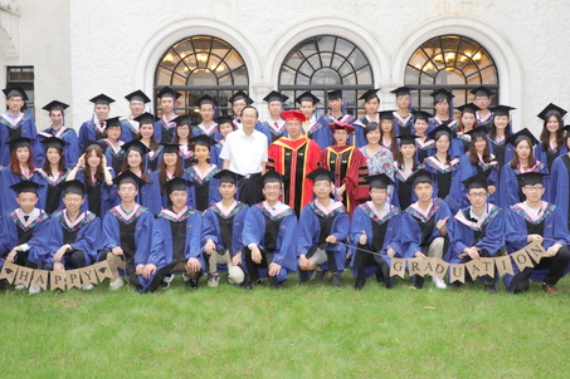
November 30, 2020
SAIF-Chenxi Donation Ceremony Held
On October 28th, the Donation Ceremony of Shanghai Chenxi Equity Investment Fund Management Co., Ltd. was held at Shanghai Advanced Institute of Finance (SAIF), Shanghai Jiao Tong University (SJTU). Prof. Guangshao Tu, Adjunct Professor of SJTU and Executive Director of the Board of Directors at SAIF, delivered a speech on behalf of SAIF. He greeted and thanked all the guests attending the event and hoped that both parties would further strive for financial research and talent training and make more contributions to the rise of China's economy. Mr. Zhenbin Yang, Secretary of the CPC Committee of STJU, reviewed SAIF’s original goal and the achievements made over the past 11 years. He pointed out that SAIF's development could not be separated from the support and assistance of all sectors of the community. He was confident that this targeted donation would effectively help SJUT's efforts to become a top-class university and establish top-class disciplines, and to better serve China's key strategic needs. He hoped that SAIF and Chenxi would work closely together, continuously explore and keep pace with the major issues of the time, innovatively carry out collaborations in talent training, think tank construction and other aspects, and jointly make unique contributions to China’s economic and social development. Later, Mr. Jiaojie Cheng, Director and Secretary-general of Shanghai Jiao Tong University Education Development Foundation, Prof. Chun Chang, Executive Dean, Professor of Finance and Huifu Chair Professor at SAIF, and Mr. Xinyu Zhou, President of Shanghai Chenxi Equity Investment Fund Management Co., Ltd. executed a donation agreement on behalf of the three parties respectively. Prof. Guangshao Tu, Mr. Zhenbin Yang, Mr. Feng Lin and Ms. Xin Yang witnessed the signing ceremony. Afterwards, Mr. Jiaojie Cheng and Prof. Jie Pan delivered donation certificates and gifts to Mr. Xinyu Zhou and Ms. Xin Yang. This donation reflects the real care and ardent expectation of alumni and their organizations for SAIF and will also significantly support SAIF’s financial research and operation. In turn, SAIF will keep the kindness in mind, forge ahead with determination, strive to repay the society with outstanding achievements, and make unremitting efforts for Shanghai to transform into an international financial center commensurate with the power of China's economy and the international position of RMB.
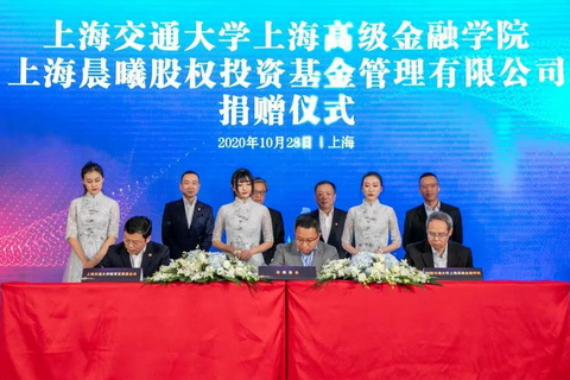
November 25, 2020
Focusing on Convergence and Innovation, China Real Estate Finance Summit 2020 Su ...
On October 29th, China Real Estate Finance Summit 2020 hosted by Shanghai Advanced Institute of Finance (SAIF), Shanghai Jiao Tong University (SJTU) was held in Shanghai. The summit brought together many top-notch guests from research institutions, financial institutions and the real estate industry at home and abroad. Focusing on the theme of "Convergence and Innovation" and in the context of the post-COVID-19 world and the new pattern of social and economic “dual circulation”, it was dedicated to the developments of global asset allocation and asset securitization to drive the sustainable and healthy growth of the real estate industry. Prof. Stephen N.S. Cheung, a leading economist, kicked off the event with a keynote speech titled "Is China the largest economy in the world?", by reviewing and analyzing a series of topics related to China's economy, and precisely positioning China's role and functions in the global economic system. The summit was comprised of three keynote speeches and four panel discussions to inspire in-depth exchanges among guests on various sub-sectors of real estate finance. It invited guests from the real estate industry and financial institutions to share their insights, to discuss the current hot topics in the sector, to brainstorm, and to make contributions to the evolution of real estate finance. Under the guidance of Shanghai Free Trade Zone Lujiazui Administration and Lujiazui Financial City Development Bureau, the summit was jointly sponsored by Shanghai Chenxi Equity Investment Fund Management Co., Ltd., with Shanghai Realway Capital Assets Management Co., Ltd. as the strategic partner. It was also highly supported by AJ (Hong Kong) Limited, Real Estate Finance Club and Wind China Conference Connecting (3C).
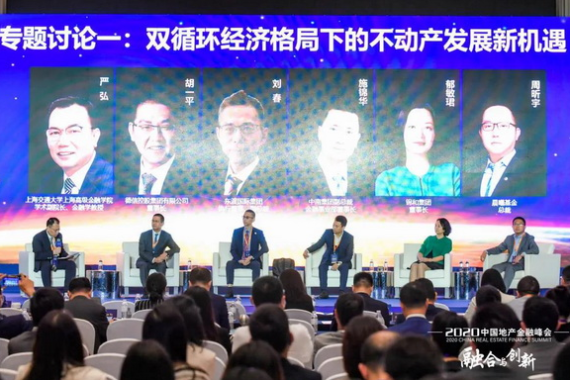
September 25, 2020
SAIF Ensures Seamless Teaching Operations in the New Semester
In September, the classrooms of Shanghai Advanced Institute of Finance (SAIF) were restored to their past vitality. Having been separated by the COVID-19 outbreak for several months, students gathered together again and sat in classroom lectures with both relief and anticipation. In order to ensure the successful return of both international and domestic students, SAIF’s academic, administrative, and IT teams (as well as MF, MBA, GES, and EMBA programs) worked together to: investigate the back-to-school intentions of faculty and students, formulate teaching plans, and facilitate the safe and orderly operations of various modules. In early July, the Academic Affairs Department began to contact local and overseas faculty (in several rounds) about their teaching preferences and worked overtime to develop teaching plans based on updated requirements. Each program, especially the SAIF MF Program (having a large proportion of international students), approached each student and tabulated the number of students who couldn’t return to campus as scheduled. In compliance with the epidemic prevention requirements of both the Ministry of Education and Shanghai Jiao Tong University (SJTU), the administrative team formulated detailed epidemic prevention guidelines and procedures for entering and leaving campus. In view of the fact that some overseas faculty and international students could not return to SAIF as scheduled, SAIF decided to implement a parallel teaching system in the Fall Semester composed of a combination of both online and offline courses. Students and faculty in mainland China would all attend in person classes, while students and faculty who couldn’t return to campus (due to restrictive entry and exit policies during the COVID-19 pandemic) would instead have online classes. In September, thirteen classes in the MBA and MF Programs would end up following the parallel system. Estimates show that at least 30 classes will implement the new system throughout the Fall Semester. The Academic Affairs Department will also realign the system periodically, according to the exigencies of the epidemic and actual circumstances on campus. In order to uphold teaching quality, the IT team implemented urgent acquisitions, upgraded teaching systems, and cooperated with the Academic Affairs Department and various programs to carry out parallel teaching training and testing among students and teaching assistants. Now, even if faculty are soley online, they can still have a clear view of the classrooms as well as seamless interaction with both online and offline students. After wide-ranging intensive preparation, starting on September 1st, SAIF Fall Semester 2020-2021 registration kicked off as scheduled. Existing full-time students registered on campus on September 1st, 2nd and 3rd, followed by new full-time students on September 4th and 5th. Alternatively, both existing and new part-time students (as well as students who couldn’t return to school due to immigration policies) registered online. Although 984 existing students and 541 new students were involved in the registration process for the new semester — due to well-designed planning— the traffic routes were clear, epidemic prevention instructions were elaborated upon, and the registration site was in order, without overcrowding. With temperature being measured, facial masks in place, and direction by SAIF security guards, the students swept in and out of the south and north entrances with valid SJTU Campus Passes. The administrative team also offered paper towels, hand sanitizers, alcohol cotton pads, disinfectant, and other cleaning and disinfection supplies at the entrances of SAIF Building, elevator lobbies, and student classrooms.
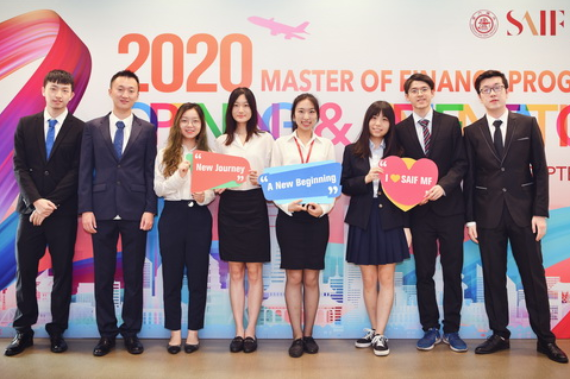
September 24, 2020
SAIF Faculty Attended INCLUSION - Bund Conference
The first INCLUSION - Bund Conference (focusing on the development of FinTech) kicked off on September 24th, 2020 by the Huangpu River in Shanghai. Several faculty members from Shanghai Advanced Institute of Finance (SAIF) were invited to present. Together with global economists, Nobel laureates, business leaders, and technological tycoons, SAIF faculty offered suggestions and advice for Shanghai's construction of a FinTech center. The China Academy of Financial Research at Shanghai Jiao Tong University (CAFR-SJTU) also participated as an academic advisor of the Alipay Financial Think Tank Alliance. At the sub-forum of the Bund Conference themed "Finance Talk on the Bund: A New Pattern Technology-driven Financial Development" — co-sponsored by Shanghai Huangpu District People's Government, Ant Group, Alipay and other institutions — Mr. Guangshao Tu (Executive Director of SAIF and Chairman of Shanghai New Finance Research Institute) delivered a keynote speech entitled "From 'Finance + Technology' to 'Technology X Finance' - Three New Patterns of Technology-driven Financial Development". He pointed out that the Bund Conference has brought a new ambience to Shanghai's financial development. The Bund is not only the origin of China's modern financial sector, with its own rich history, but has also experienced the evolution of China's financial reform and opening up — as well as the construction and development of an international financial center. In the future, it will become a beacon of Shanghai's financial development. During the conference, Professor Hong Yan (Deputy Dean for Faculty and Research and Professor of Finance at SAIF) gave a live interview to discuss how technology enables finance and helps to open up global financial markets. Professor Yan shared his insights on the impact of the development of FinTech on the recovery and sustainability of the global economy; the realization and innovative exploration of the goals of inclusive finance; the changes that big data, cloud computing, artificial intelligence, and block chain technologies bring to China's financial ecosystem; and the regulatory technology system needed for the healthy development of FinTech. Professor Feng Li attended the inauguration ceremony of the Alipay Financial Think Tank Alliance at the special session of "2020 Fortune Partner Conference - Intelligence + Connectivity + Conference". He is a Professor of Accounting at SAIF, the Associate Director of the China Academy of Financial Research (CAFR), and the Co-Director of the Shanghai Advanced Institute for Financial Research (SAIFR). Over the years, SAIF has always paid close attention to the development of FinTech. In this field, it has been determined to forge ahead and innovate continuously in academic research, talent training, and think tank construction. As an international financial school born in response to the national strategy of "building Shanghai into an international financial center", SAIF will continue to adhere to the mission of "gathering first-class international faculty, training high-end financial professionals, building an open research platform and forming a top-level policy think tank". We will contribute to Shanghai's transformation as an international financial center and to the development of China's financial sector at large.

September 22, 2020
SAIFR Private Economy Research Center Officially Launched
On September 19th, the closed meeting entitled “Trends and Solutions of Private Economy” was held and the opening ceremony of the Private Economy Research Center of Shanghai Advanced Institute for Financial Research (SAIFR) was successfully launched. It was jointly organized by the China Academy of Financial Research, Shanghai Jiao Tong University (CAFR-SJTU), SAIFR and its Private Economy Research Center. A number of distinguished guests were invited to witness the inception of the new Research Center and to discuss trends and solutions. Prominent attendants included: Mr. Guangshao Tu, Adjunct Professor of Shanghai Jiao Tong University and Executive Director of the Board of Shanghai Advanced Institute of Finance (SAIF); and Mr. Hanmin Zhou, Member of the Standing Committee of the National Committee of CPPCC, Vice Chairman of the Central Committee of China Democratic National Construction Association, Vice Chairman of Shanghai CPPCC, and Chairman of Shanghai Committee of China Democratic National Construction Association.
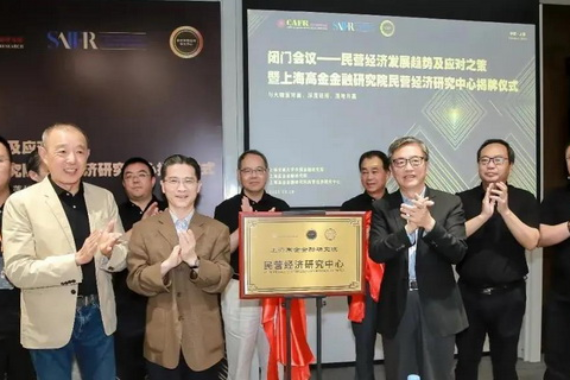
September 18, 2020
SAIF Launched Chair Professor Mechanism
On September 14th, the Shanghai Advanced Institute of Finance (SAIF) at Shanghai Jiao Tong University (SJTU) awarded the titles of SAIF Chair Professor and Huifu Chair Professor to Professors Jun Pan and Chun Chang, respectively. This marks the inauguration of SAIF’s chair professor mechanism. One of the first distinguished professors at SAIF’s inception in 2009, and holding both a Ph.D. in Finance from Stanford University and a Ph.D. in Physics from New York University, Professor Jun Pan joined SAIF on a full-time basis in 2019. Prior to SAIF, Professor Pan taught at the Massachusetts Institute of Technology (MIT) for nearly two decades and was awarded tenured professorship. She was also granted the MIT Chair Professorship for her outstanding research in the field of finance. One of the first Mainland China scholars to teach finance in a world-class business school in the United States, Professor Chun Chang served as Professor of Finance at the Carlson School of Management at the University of Minnesota for 17 years. He is also the first Chinese scholar in finance to give up a tenured professorship in the United States and return to China on a full-time basis. Professor Chang has outstanding research achievements in corporate finance and macro-finance, lately as evidenced by his winning the Sun Yefang Financial Innovation Award. In the past decade, Professor Chang, as Executive Dean of SAIF, made remarkable contributions to SAIF’s development. A chair professor mechanism is a way for world-class universities and colleges to attract talent and build up core academic and research frameworks. A chair professor title is regarded as the top honor of the teaching pyramid. Among world elite universities, scholars who have received a title of chair professor are all distinguished professors in their respective fields. In general, chair professor seats are closely related to public donations. The model of “chair donation fund”, combining the chair professor system with public donations and modern fund management systems, has become an effective means for attracting public resources, retaining first-class scholars, consolidating academic strengths, and improving teaching quality and social influence. The chair professor system implemented by SAIF also follows this model. The SAIF Chair Professor Fund was established with the help of donations from several companies and alumni; the Huifu Chair Professor Fund was set up by and named after Huifu Co., Ltd., a company founded by Dr. Ye Zhou, one of the first graduates of the SAIF GES Program. The full amount of the investment proceeds of both funds will be dedicated to, and subsidize the compensation and research expenditures of, chair professors. This will provide a more stable funding guarantee for outstanding scholars to pursue long-term and important research topics. The SAIF Faculty Management and Remuneration Committee is responsible for selecting and deciding upon candidates for chair professorships, approving budgets, management, and auditing use of the fund. Professor Hong Yan, Professor of Finance and Deputy Dean of SAIF, commented: “For SAIF, to build a world-class financial school, it must have a strong faculty team with an international perspective and world-class standards. The establishment of the chair professor funds and the implementation of the chair professor mechanism is to set benchmarks in the faculty team and recognize outstanding professors for their extraordinary achievements in academic research and talent training. We hope that in the future, we will continue to attract top-notch and world-renowned experts and scholars in economics, finance and management at home and abroad to join SAIF and further expand SAIF’s international faculty team."
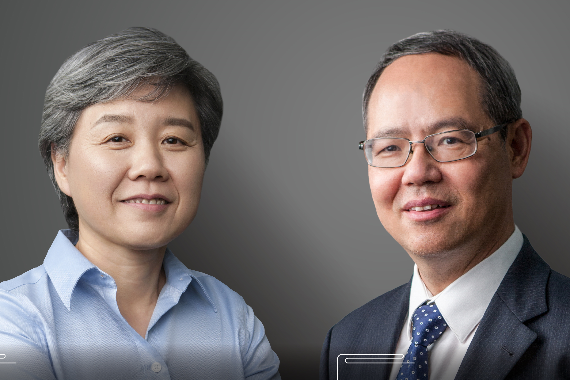
September 18, 2020
Donation Ceremony of Huifu Chair Professor Fund Held at SAIF
On September 14th, the donation ceremony of the first titled chair professor fund, the Huifu Chair Professor Fund, was held on the Xuhui Campus of Shanghai Advanced Institute of Finance (SAIF) at Shanghai Jiao Tong University (SJTU). Professor Guangshao Tu, Adjunct Professor at SJTU and Executive Director of SAIF; Ansheng Zhang, Member of the Standing Committee of CPC Committee and Vice President of SJTU; and Dr. Ye Zhou, Chairman and CEO of Huifu Co., Ltd. and one of the first graduates of SAIF GES Programs, all attended the ceremony and delivered speeches. Jie Pan, Associate Dean of SAIF, presided over the ceremony. Professors Chun Chang and Hong Yan, and many representatives from the SJTU Education Development Foundation, the Huifu Co., Ltd., and SAIF alumni were present at the event. After the ceremony, the guests also witnessed the setup of a golden plaque marked with the Huifu logo on the donation wall of SAIF. Afterwards, the guests were invited to the dean's banquet, which was hosted by Professor Hong Yan. During the banquet, Professor Chun Chang welcomed all alumni representatives back to their alma mater, and thanked SAIF for the award and recognition.
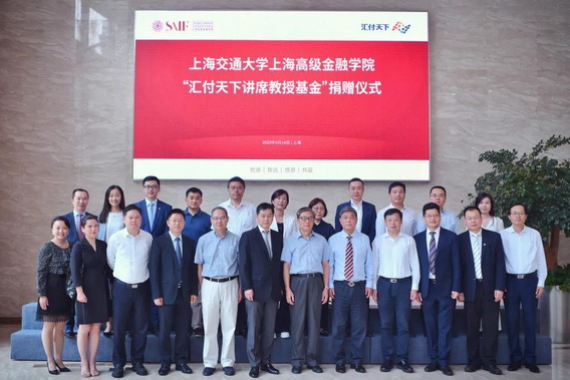
September 08, 2020
"Corporate Value Research" Cooperation Launched at SAIF
On September 3rd, the launching ceremony of the "Corporate Value Research" cooperation between the Corporate Finance Research Center of the China Academy of Financial Research (CAFR) at Shanghai Jiao Tong University (SJTU) and the Beijing Qirong Zhishang Technology Co., Ltd. was held at the Shanghai Advanced Institute of Finance (SAIF), SJTU. Professors Chun Chang, Hong Yan, and Zhan Jiang were in attendance. Hui Xie, Executive Dean of the Hong Kong China Capital Research Institute and Chairman of Beijing Qirong Zhishang Technology Co., Ltd.; and Shuyan Li, General Manager of Shanghai Operations at Beijing Qirong Zhishang Technology Co., Ltd. also attended the event. At present, the weight of direct financing is only around 15% among Chinese businesses, while the figure exceeds 80% in the US and other developed economies. In response to this phenomenon, the Office of the State Council of the People’s Republic of China recently issued Several Opinions on Strengthening Financial Services to Private Enterprises, which mentioned “actively supporting private enterprises to expand direct financing”. Local governments must also consider support to the direct financing of enterprises and financing through capital markets as priorities. Although the development of the registration system and capital market reforms have created more opportunities for direct financing, the growth of direct financing for enterprises still encounters many difficulties. In this context, the CAFR Corporate Finance Research Center and Beijing Qirongzhishang Technology Co., Ltd. jointly conducted research on corporate value, aiming to establish a corporate valuation system with greater logic, rationality, effectiveness, and accuracy. At the launching ceremony, Hui Xie was appointed as Part-time Research Fellow at CAFR Corporate Finance Research Center and Professor Chang presented him with the Letter of Appointment. Through this cooperation, the two parties will work closely to translate research findings into financial sector advantages for China’s future.
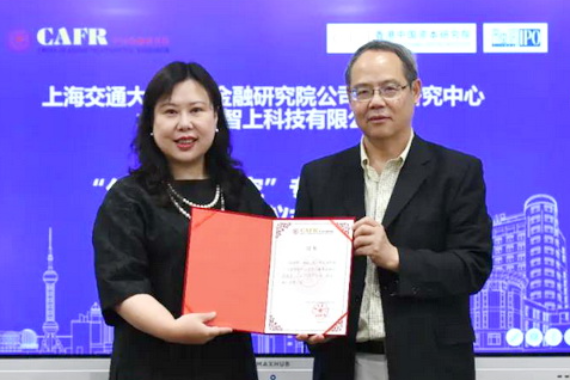

211 West Huaihai Road
Shanghai 200030, China
Tel: +86 21 6293 3500
9th Floor, Building T6, Hongqiao Hui
990 Shenchang Road
Shanghai 201106, China
3rd Floor, Building D, Chenfeng Building
800 Tongpu Road
Shanghai 200062, China
5th Floor, West Tower, World Financial Centre
1 Dong San Huan Middle Road
Chaoyang District, Beijing 100020, China
Tel: +86 10 5081 5880
1203 Tower 7, One Shenzhen Bay
Nanshan District, Shenzhen 518000, China
Tel: +86 755 8663 8815
© Shanghai Advanced Institute of Finance All Rights Reserved.


Top